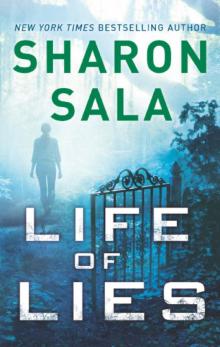- Home
- Sharon Sala
Out of the Dark
Out of the Dark Read online
Praise for New York Times bestselling author
SHARON SALA
“Well-developed secondary characters and a surprising ending spice up Sala’s latest romantic intrigue.”
—Publishers Weekly on Snowfall
“Spellbinding narrative…Sala lives up to her reputation with this well-crafted thriller.”
—Publishers Weekly on Remember Me
“Wear a corset, because your sides will hurt from laughing! This is Sharon Sala at top form. You’re going to love this touching and memorable book.”
—New York Times bestselling author Debbie Macomber on Whippoorwill
“Ms. Sala draws you in from the very beginning. She delivers main characters who will touch your hearts and quirky secondary characters who will intrigue you as you try to figure out whodunit.”
—Romantic Times BOOKclub on Butterfly
“Whippoorwill is a funny, heartwarming story, set in a raw, untamed land and rich with indelible characters that will stay with you long after the last page is turned. I didn’t want it to be over.”
—Deborah Smith, New York Times bestselling author of A Place to Call Home
“Once again, Sharon Sala does a first-rate job at blending richly developed characters and inspired plotting into an unforgettable read.”
—Romantic Times BOOKclub on Dark Water
Also by SHARON SALA
THE CHOSEN
MISSING
WHIPPOORWILL
DARK WATER
SNOWFALL
REMEMBER ME
REUNION
SWEET BABY
MIRA Books is also proud to publish
Sharon Sala under the pseudonym
DINAH MCCALL
Watch for Dinah McCall’s next novel
of romantic suspense
THE SURVIVORS
SHARON SALA
Out of the Dark
I struggled through the writing of this book in a way that I’ve never done before. The tragedies of incurable illnesses and child abuse seem impossible to comprehend, let alone to find a way to acknowledge. But acknowledge them we must, because they come to us despite every good intention we have.
Once having acknowledged them, we must then strive to find answers, and after answers, solutions. All the money, all the research and all the commitments in the world will not solve a thing until we first search within ourselves to see what it is that makes us look away instead of reach out.
Know that anyone can become a victim of illness or crime; for shame to those who blame and denounce a disease as just punishment for a certain lifestyle, when in truth, disease has no boundaries. And for shame to all who blame crime on poverty and lack of education, when we know it comes from every walk of life.
And so I dedicate this book to those who have been stricken with diseases that have no cures, and to the children who have suffered hell on earth from abuse at others’ hands. Fate was often not kind to you, but know that we have cried for you when you could not cry for yourself.
Contents
Chapter One
Chapter Two
Chapter Three
Chapter Four
Chapter Five
Chapter Six
Chapter Seven
Chapter Eight
Chapter Nine
Chapter Ten
Chapter Eleven
Chapter Twelve
Chapter Thirteen
Chapter Fourteen
Chapter Fifteen
Chapter Sixteen
Chapter Seventeen
Chapter Eighteen
Chapter Nineteen
Chapter Twenty
Chapter Twenty-One
Chapter Twenty-Two
Chapter Twenty-Three
Chapter Twenty-Four
Epilogue
One
St. Louis, Missouri—1977
It was just after midnight when Margaret Cochrane opened her eyes to look at the face of her sleeping husband. She’d been Sam Cochrane’s wife for seven years and Jade’s mother for four, and once she’d loved Sam Cochrane more than life. But during the past year, she’d struggled unsuccessfully to hide her unhappiness with herself and with life. Times were changing. The country had been at war for years in a land she could barely pronounce. Young men had abdicated their military duty by escaping to countries outside of the U.S. to keep from being drafted. People Margaret’s age had staged sit-ins in protest, burned flags and marched on Washington, D.C. She felt as if life had passed her by. She had so wanted to be a part of it—to make a change in the world. But her responsibilities as a wife and mother had precluded those options. To satisfy her emotional drought, she had decided to enroll in a self-realization course at a local community college.
Then one day, less than two weeks into the course, she had taken a shortcut across the campus greens to the bus stop and found the path blocked by a large gathering of people. She’d seen their kind before, but never up close. Both men and women wore their hair long and hanging loose about their faces. Some had flowers woven into their hair; others carried bouquets and handed out a flower to anyone who wandered by. They dressed like gypsies from some Hollywood movie, in bright, colorful fabrics—the women in dresses that brushed against their ankles, the men in tight pants and long psychedelic print shirts that hung halfway to their knees. They referred to themselves as the People of Joy and were led by a man who called himself Solomon.
Margaret stopped out of curiosity, listening halfheartedly to their talk of free love and making peace, not war, until the man who called himself Solomon stepped off the low wall on which he’d been standing and started toward her.
One look from the dark-eyed, charismatic leader and she’d been hooked. He’d smiled at her, touched her face, then her hair, with the back of his hand. She felt the warmth of his breath as he bent down and placed a flower in her hair above her ear. As he did, the crowd around them had laughed then applauded, and something within Margaret had soared. One day ran into the next, and then the next, until she was at the campus almost daily. Seven days after her first encounter with Solomon, she’d gone again, only this time with Jade.
The People treated her child as if she was a princess, exclaiming over Jade’s stunning beauty, even weaving flowers into her curly black hair and painting a tiny butterfly on the baby doll curve of her cheek. They praised Margaret until she felt as if she’d given birth to a holy child. Within the short space of that week, the emptiness in her heart had been replaced with a false sense of family. And so the brainwashing of Margaret Cochrane had begun.
Six months later, she was about to break her marriage vows to the man she’d sworn to love, honor and cherish. If that wasn’t daunting enough, she was also about to steal away his only child. More than once she’d thought about telling him, but she knew he would never understand.
She slipped out of bed, careful not to wake Sam, then stood within the darkness of the room, looking down at his face. He was so good-looking, and he did love her. But he was always busy, and he didn’t understand her. It seemed to Margaret as if everything mattered more to him than she did. There was a brief moment of hesitation before her eyes narrowed purposefully. Quickly she slipped off her nightgown and dressed, choosing a long, ankle-length dress made of a blue, flowered fabric that she’d purchased yesterday. She picked up her shoes, waiting to put them on until she had stepped into the hall. With a quick backward glance over her shoulder, she hurried next door to Jade’s room and slipped inside.
The baby was sleeping like the angel she was. Margaret thought of what she was about to do and hesitated again. Sam was going to be devastated. He doted on Jade, and it would be easier if she left Jade behind. Margaret knew it wouldn’t be difficult for him to find a nanny. But the
n she thought of how the People had praised her for giving birth to such a perfect child and was afraid to leave her behind. Jade had become part of her identity with the People.
Having settled that in her mind, she bent down, and as she did, her long blond hair fell forward, hiding her face like a veil. She brushed the dark tangles from her baby’s cheek then whispered softly in her ear.
“Jade…wake up, honey. We’re going for a ride.”
Four-year-old Jade Cochrane rolled over onto her side, subconsciously pulling away from her mother’s grasp.
“No, Mommy,” she muttered, her voice thick with sleep. “Don’t wanna go.”
Margaret glanced nervously over her shoulder, then grabbed the pink blanket that was Jade’s sleeping companion and wrapped her up in a larger blanket before lifting her out of the bed.
“Sure you do,” Margaret whispered. “You’re Mommy’s girl, and Mommy can’t go without you.”
Unaware that the pink blanket had fallen onto the floor, Margaret carried Jade out of the room, then hurried down the stairs of the old family mansion. Within seconds, she was out the door and running down the long drive toward an old blue Volkswagen van parked at the curb. As she approached, the side door slid open. Two bearded men wearing soft flowing robes and ponytails met her with open arms, took Jade out of her arms, then followed her into the van. Within seconds, the door slid shut. There was a moment when Margaret looked up at the two men in the darkness and started to panic. Then one of the men took a hand-rolled joint out of his mouth and offered it to her.
“Here, pretty lady…have a toke.”
Margaret shivered as she put the marijuana cigarette into her mouth. She inhaled sharply, held her breath for a moment to let the drug cycle through her brain, then exhaled through her nose. The kick of the drug silenced her conscience as competently as if she’d put a gun to her head and pulled the trigger. Two more pulls from the joint and she knew that she was right where she wanted to be.
Jade whimpered. One of the men pulled the covers up over her shoulder, then shifted her to the back of the van as the other man reached for the joint dangling between Margaret’s fingers. He took a long drag, then put the vehicle in gear and sped away.
Inside the house, Sam Cochrane rolled over in bed, felt the empty pillow beside his head and sat upright with a jerk. His wife’s absence wasn’t unusual. She often got up in the night to check on Jade. But there was something about the silence of the house that felt different. There was a vacuum in the space where love was supposed to be.
“Maggie?”
No one answered.
He got up out of bed and hurried next door to their daughter’s room. The room was dark, the door ajar. He shoved it aside and walked in, only to find the bed empty and his daughter gone. When he saw the pink blanket lying on the floor next to the bed and Jade nowhere in sight, his heart skipped a beat. Jade never slept without it. This time, when he called his wife’s name, he was yelling.
“Maggie!”
Still no answer.
He turned on lights as he ran through the house, running up to the third floor, then back through the second, before going down the stairs to the main floor. It wasn’t until he got to the foyer and found the door standing open that reality hit.
They were gone, and while the possibility of foul play couldn’t be ruled out, in his heart, he knew what she’d done. The signs had been right in front of him for weeks, but he’d ignored them, refusing to believe Maggie was that unhappy, unwilling to admit that any part of it was his fault. He’d seen the love beads lying on her dresser, noticed the changes she’d made in her hairstyle and clothes. Last week he’d come home early and seen what society called a “hippie” van pulling out of the driveway. When he’d questioned Maggie about it, she’d shrugged it off by saying it was only people asking for directions. He hadn’t believed her, but he’d been unwilling to broach the subject. And now it was too late.
He ran out onto the lawn and then down the driveway just in time to see a pair of taillights disappearing down the street.
“Maggie! Come back! Come back! For God’s sake…come back!”
His screams shattered the silence of the night as he raced down the street chasing the taillights, but it was no use. The vehicle disappeared. She was gone, and she’d taken their baby with her.
1997
Pink and green reflections from the flashing neon sign outside the bedroom window painted the couple sleeping on the bed in eerie, garish flashes of color, giving their faces a harlequined appearance.
Outside the hotel, a police car sped past with sirens screaming. At the sound, the woman flinched and then started to moan, which quickly roused the man sleeping beside her.
His name was Raphael, and for as long as he could remember, Jade had been the only person he had ever loved. He rose up on one elbow to look at her, wincing as movement caused the room to tilt. Ignoring a slight wave of nausea, he swiped a shaky hand across his face, then looked down at Jade.
She was dreaming again. He could see it on her face. The hell of their childhood had scarred them both in ways no one could know. If he had believed in God, he would have prayed for peace in their hearts, but the way he figured it, God was just a myth. If He had existed, He would never have let happen what had happened to them. So it was up to him to ease Jade’s nightmares.
He bent down until his mouth was only inches away from her ear, then whispered softly, “Jade…Jade…it’s all right, baby…it’s all right. No one’s going to hurt you…not anymore.”
Then he slipped his arm beneath the curve of her neck and pulled her close against his chest.
Somewhere within the depths of Jade’s mind, the familiarity of Raphael’s voice registered. When it did, her panic subsided. She shuddered, then sighed.
“Yes, that’s it,” Raphael whispered, stroking her hair until he felt her body relax. “You’re safe. You’re safe. You’re always safe with me.”
Jade slept again, but Raphael did not. Sleep had become his nemesis, stealing time he was reluctant to waste. There was a knot in his stomach that had nothing to do with the nausea he’d suffered only moments ago. It was fear, pure and simple. Jade was his life—his world—but in his need to protect her from the hell of their past, he’d done something wrong, something that he had to put right. She’d come to depend upon him so much that he wasn’t sure if she would ever be able to function on her own. He hadn’t meant to do it, but it had happened just the same.
Still asleep, she turned in his arms and then laid her cheek against his chest. The warmth of her sigh was a caress upon his skin. He swallowed past the knot in his throat, then threaded his fingers through her hair, unconsciously fisting the length of it in his palm.
“Love you, pretty girl,” he said softly, then turned his head toward the window, waiting for dawn.
“Are you sure you want to take this?” Raphael asked, as he steadied the oversized painting Jade had just handed him against his leg.
Jade glanced up from the stack of paintings she was packing, eyed the one Raphael was holding, then shrugged.
“It’s just a painting. We need the money.”
Raphael frowned. “We always need the money, but this is a painting of your mother.”
Jade straightened, then turned, fixing him with a cool, pointed look.
“That’s not my mother. That’s Ivy.”
Raphael’s frown deepened. “They are one and the same, and you know it.”
“No, they aren’t. My mother was a…she…damn it, Rafie, I can barely remember her or Ivy. My mother turned into some mushroom smoking hippie named Ivy. When she died, she left me in hell. Why should I care about some stupid picture of her? I don’t even know why I painted it to begin with, so pack it.”
“Yes, ma’am.”
Jade glared at the smirk on Raphael’s face, trying to maintain her anger, but she couldn’t. Instead they packed up their stuff and headed out the door. A neighbor was giving them a ride in his truck t
o the street fair. The sun was shining; the sky was clear. It was promising to be a good day.
Jade smiled at Raphael as they rode in the back of the truck, holding on to the paintings she was hoping to sell. He glanced at her and winked, then focused on the stack of canvases he was holding.
Jade sighed. She could never be mad at the man who’d saved her life. He wasn’t just her best friend, he was the other half of her heart. And the fact that she’d taken the last of their savings to pay booth rent at a street fair in downtown San Francisco had been risky. They’d been hungry too often and homeless far more than she cared to count, so saving back any of her paintings, even the one of Ivy, was not only foolish, it was wasteful. Yet as they rode through the busy San Francisco streets, Jade couldn’t help staring at the faces of the people they passed—convinced that one day their past would catch up with them and terrified of what would happen when it did.
She had little to no memory of anything before Ivy. Only now and then did she dream about a tall, dark-haired man who had played with her in a wading pool and rocked her to sleep. But the facial features were always vague, and when she woke, the image was always gone.
Most of the time, the face in her nightmares belonged to Solomon. Solomon of the smiling face—who smelled of incense and smoke—who brushed her hair and stroked her face and, the day after Ivy had died, had sold her tiny, six-year-old prepubescent body to a pedophile who preyed on little girls. He had been the first, but certainly not the last, man who’d paid money to ravage her body. And for the ensuing six years, she, like Raphael, became a marketable product for the People of Joy.

 Blind Faith
Blind Faith Second Sight
Second Sight Count Your Blessings
Count Your Blessings The Missing Piece (The Jigsaw Files)
The Missing Piece (The Jigsaw Files) Bloodlines
Bloodlines Sudden Danger
Sudden Danger King's Ransom
King's Ransom Once in a Blue Moon
Once in a Blue Moon A Rainbow Above Us
A Rainbow Above Us Always a Lady
Always a Lady Touchstone
Touchstone The Whippoorwill Trilogy
The Whippoorwill Trilogy I, Gracie
I, Gracie Honor's Promise
Honor's Promise Rider on Fire
Rider on Fire The Gathering
The Gathering Don't Cry for Me
Don't Cry for Me The Way Back to You
The Way Back to You Swept Aside
Swept Aside Blood Stains
Blood Stains Chance McCall
Chance McCall Out of the Dark
Out of the Dark For Her Eyes Only
For Her Eyes Only 'Til Death (A Rebel Ridge Novel)
'Til Death (A Rebel Ridge Novel) Roman's Heart
Roman's Heart Snowfall
Snowfall Dark Hearts
Dark Hearts Mission: Irresistible
Mission: Irresistible A Place to Call Home
A Place to Call Home Betrayed
Betrayed The Lunatic Detective
The Lunatic Detective The Dove
The Dove Windwalker
Windwalker The Miracle Man
The Miracle Man The Curl Up and Dye
The Curl Up and Dye Familiar Stranger
Familiar Stranger Sweet Baby
Sweet Baby The Boarding House
The Boarding House Bad Penny
Bad Penny Remember Me
Remember Me Race Against Time
Race Against Time The Dove (Prophecy Series)
The Dove (Prophecy Series) The Way to Yesterday
The Way to Yesterday The Healer
The Healer The Color of Love
The Color of Love Missing
Missing Next of Kin
Next of Kin A Field of Poppies
A Field of Poppies Cold Hearts
Cold Hearts Deadlier than the Male
Deadlier than the Male Color Me Bad: A Novella
Color Me Bad: A Novella Lunatic Times Two: 4 (The Lunatic Life Series)
Lunatic Times Two: 4 (The Lunatic Life Series) Capsized
Capsized Sympathy Pains
Sympathy Pains ROYAL'S CHILD
ROYAL'S CHILD In Shadows
In Shadows 3, 2, 1...Married!
3, 2, 1...Married! Family Sins
Family Sins The Chosen
The Chosen Life of Lies
Life of Lies Lunatic Revenge
Lunatic Revenge When You Call My Name
When You Call My Name I'll Stand By You
I'll Stand By You Saving Jake
Saving Jake Going Gone
Going Gone ANNIE AND THE OUTLAW
ANNIE AND THE OUTLAW Butterfly
Butterfly Cut Throat
Cut Throat Ryder's Wife
Ryder's Wife The Hen House
The Hen House Amber by Night
Amber by Night The Amen Trail
The Amen Trail Mimosa Grove
Mimosa Grove Dark Water
Dark Water Wild Hearts
Wild Hearts Blood Trails
Blood Trails The Warrior
The Warrior Shades of a Desperado
Shades of a Desperado Going Twice
Going Twice A Piece of My Heart
A Piece of My Heart You and Only You
You and Only You Nine Lives
Nine Lives Whippoorwill
Whippoorwill